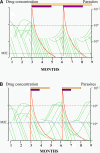Intermittent presumptive treatment for malaria
- PMID: 15696210
- PMCID: PMC545196
- DOI: 10.1371/journal.pmed.0020003
Intermittent presumptive treatment for malaria
Abstract
A better understanding of the pharmacodynamics of intermittent presumptive treatment, says White, will guide more rational policymaking
Conflict of interest statement
Figures




References
-
- Schultz LJ, Steketee RW, Macheso A, Kazembe P, Chitsulo L, et al. The efficacy of antimalarial regimens containing sulfadoxine-pyrimethamine and/or chloroquine in preventing peripheral and placental Plasmodium falciparum infection among pregnant women in Malawi. Am J Trop Med Hyg. 1994;51:515–522. - PubMed
-
- Verhoeff FH, Brabin BJ, Chimsuku L, Kazembe P, Russell WB, et al. An evaluation of the effects of intermittent sulfadoxine-pyrimethamine treatment in pregnancy on parasite clearance and risk of low birthweight in rural Malawi. Ann Trop Med Parasitol. 1998;92:141–150. - PubMed
-
- Parise ME, Ayisi JG, Nahlen BL, Schultz LJ, Roberts JM, et al. Efficacy of sulfadoxine-pyrimethamine for prevention of placental malaria in an area of Kenya with a high prevalence of malaria and human immunodeficiency virus infection. Am J Trop Med Hyg. 1998;59:813–822. - PubMed
-
- Shulman CE, Dorman EK, Cutts F, Kawuondo K, Bulmer JN, et al. Intermittent sulphadoxine-pyrimethamine to prevent severe anaemia secondary to malaria in pregnancy: A randomised placebo-controlled trial. Lancet. 1999;353:632–636. - PubMed
-
- Njagi JK, Magnussen P, Estambale B, Ouma J, Mugo B. Prevention of anaemia in pregnancy using insecticide-treated bednets and sulfadoxine-pyrimethamine in a highly malarious area of Kenya: A randomized controlled trial. Trans R Soc Trop Med Hyg. 2003;97:277–282. - PubMed
Publication types
MeSH terms
Substances
Grants and funding
LinkOut - more resources
Full Text Sources
Medical

